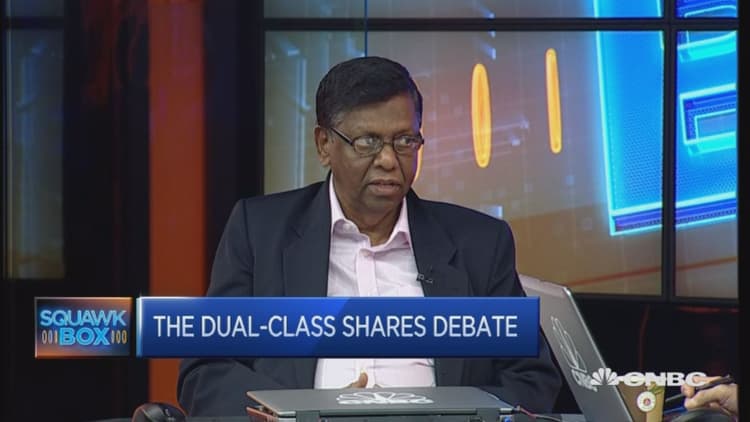
One of Singapore's most prominent shareholder advocates has renewed his call for the introduction of a dual-class share structure for the local bourse, as public debate on the hot topic hits fever pitch.
"Activists say we should not be entertaining dual class shares, I say do it, with safeguards," David Gerald, president and CEO of the Singapore Investors Association told CNBC's Squawk Box.
The organization represents more than 70,000 retail investors and is the largest organized investor group in Asia.
"Any capital market that is aspiring to be leading in this part of the region should have that," he said.
"Retail investors should not be taken to be idiots, they're educated, they're knowledgeable and they should make an informed decision."
Dual class shares are just one component of a series of proposals that the Singapore Exchange (SGX) has put forward for public consultation, in a move aimed at improving its international competitiveness, building retail market participation and enhancing overall market liquidity.
Striking a balance
Under current SGX rules, each company has a "one share, one vote" structure.
If introduced, a dual-class structure would allow newly listed companies to offer two separate types of shares. Typically, one class of shares may have more voting rights than the other, even though the share is issued from the same company.
Under the current proposal, companies could offer a maximum voting differential of 10-to-1, meaning if a company listed two classes of shares on the market, one class of share could have at most 10 times more voting rights than the other.
Recent American IPOs such as Snap Inc. took advantage of the dual class share structure in the US. Snap Inc. was the first IPO of its kind to controversially offer "no vote" stock, meaning investors in that class of share would have no say in the company strategy or governance.

Major American technology companies such as Alphabet (the parent company of Google), Facebook and Alibaba Group also offer dual class shares on other exchanges.
The introduction of dual class shares would enable Singapore to compete for major international listings, as competition between regional bourses for big IPOs gains momentum.
Speaking at the recent Singapore Equities Dialogue, SGX CEO Loh Boon Chye said investors and companies have become more sophisticated and the SGX must remain relevant.
"An attractive dual-class structure could enable entrepreneurs to swiftly accelerate business expansion, while continuing to lead the strategies and growth of their companies," he said.
"It is an example of how we can potentially innovate, regulate and conduct business in a forward-looking manner – all with the aim of enhancing our attractiveness as a listings venue and addressing the expectations of different stakeholders."
If introduced, The Singapore Exchange would be the only major bourse in the region to allow the structure, which may give it a competitive edge for IPOs, specifically in the technology space.
Not that easy
Opponents to dual class shares insist that adequate safeguards must be put in place to ensure retail investors are protected.
"Retail market participation dwindled after the penny stock crash, and it put fear into retail investors," said Gerald.
"We need to bring about initiatives that will encourage them to enter the market and to make them feel comfortable to come back to invest. We welcome these initiatives, I think it will increase liquidity and I think it will improve the participation of retail over time."
The SGX has proposed restricting the issuance of dual-class shares to new IPOs only. It also proposed that dual class shares be converted to standard, one vote shares when the share changes hands.
A sunset clause, where the dual class share is converted into a single class at a future date, was also part of a series of other protection proposals.
The consultation is open until Apr 17.
A Push for more
In addition to the potential introduction of dual class shares, the SGX has detailed a series of proposals aimed at improving its market structure.
As the public consultations continue to take shape, the SGX says it's optimistic that as the global economy picks up, more IPOs will come onboard in the coming months.
"As a fund-raising platform, we not only want to facilitate capital raising for established and mature companies. We also want to be an attractive platform to early-stage companies, which may have disruptive business models and potentially be tomorrow's Google or Facebook," said Loh.
"Since the beginning of this year, our securities daily average value is up 14% year-on-year for January and February. We have also welcomed two IPOs and two RTOs which raised a total of S$182 million and added a combined market capitalization of close to S$1 billion to our market."
But the work is just getting started.
"Our market is still a small market," said Gerald.
"Valuation has been a major reason why we have not been that attractive. Having said that, within South East Asia, I think Singapore is still the number one. We are the gateway to Asia but there is a lot more to be done."


